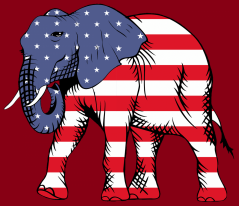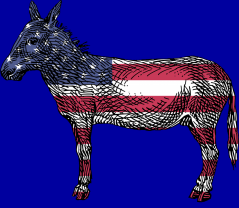Elephants and Donkeys Are Killing The United States: Why We Need Political Diversity
While the opinions expressed in our own social networks may overwhelmingly predict our presidential candidate winning by a landslide, almost half of Americans polled support the candidate we oppose. As Democrats and Republicans have increasingly distanced themselves socially and physically from each other, we have found ourselves doubling down on our own moral superiority and demonizing anyone who doesn't agree with our point of view. This political polarization may help our own group in the short run, but leads to a host of negative downstream consequences—both for our own understanding of the world and for the nation’s success.
 A common symbol of the Republican Party, the more conservative or right-leaning major U.S. political party, is an elephant. The color red is also associated with this party.Think about how bewildered you are that anyone in their right mind would vote for [insert Hilary Clinton or Donald Trump’s name here]. Now, go look at their current polling numbers. As of September 5th, 2016, Clinton has a slight lead over Trump, but both have support percentage ratings in the low 40s (Andrews, Katz, & Patel, 2016). Somehow, despite the fact that you may not know anyone who is planning on voting for them (other than that crazy relative you don’t talk to), almost half of Americans polled support the candidate you oppose.
A common symbol of the Republican Party, the more conservative or right-leaning major U.S. political party, is an elephant. The color red is also associated with this party.Think about how bewildered you are that anyone in their right mind would vote for [insert Hilary Clinton or Donald Trump’s name here]. Now, go look at their current polling numbers. As of September 5th, 2016, Clinton has a slight lead over Trump, but both have support percentage ratings in the low 40s (Andrews, Katz, & Patel, 2016). Somehow, despite the fact that you may not know anyone who is planning on voting for them (other than that crazy relative you don’t talk to), almost half of Americans polled support the candidate you oppose.
We see people on our side as righteous and brave and people on the other side as either uninformed, stupid, or even downright evil. As with so many moral conflicts before, it is like a wall has come up between the two ideological camps.
Recently, this wall that comes up in moral conflicts has been increasingly contributing to animosity and gridlock between the two ideological poles in the United States for both the political elite and the overall population. Government is the most polarized that it has been since the American Civil War, leading to record high numbers of filibusters and plummeting numbers of moderate congresspersons (United States Senate, 2016; VoteView.com, 2016). This trend directly parallels the growing partisan divide between the values and ideological beliefs endorsed by Americans who identify as Democrats and Republicans (Pew Research Center, 2012). Now more than ever, we are choosing to physically sort ourselves into moral and political enclaves, which has led to most congressional districts becoming either overwhelmingly “blue” or “red” (Motyl et al., 2014). Liberals or left-leaning individuals are moving to urban centers for political reasons, and conservatives or right-leaning individuals are avoiding them to keep away from the liberals (Silver, 2012). With cable TV, internet, and social media now providing hundreds of explicitly partisan news sources which tailor to their specific audiences, we are also choosing our media consumption based on the partisan reputation (e.g., Fox News, The Daily Show).
This self-sorting into ideological camps has resulted in a majority of Americans polled reporting fearful and very unfavorable views of those belonging to the opposing party (Pew Research Center, 2016). Partisan selective exposure in media consumption has led to greater political polarization of the general public (Levendusky, 2013; Stroud, 2010). At all levels of society, we are doubling down on our own group’s moral superiority and punishing anyone who works with the other side as a traitor.
The negative ramifications of political polarization
 A common symbol of the Democratic Party, the more liberal or left-leaning major U.S. political party, is a donkey. The color blue is also associated with this party.But if those other guys are wrong, we are right, and we don’t like them anyway, why should we care? Remember how you don’t know many people who would vote for [Clinton/Trump], and yet somehow 40% or more of Americans’ polled support them?
A common symbol of the Democratic Party, the more liberal or left-leaning major U.S. political party, is a donkey. The color blue is also associated with this party.But if those other guys are wrong, we are right, and we don’t like them anyway, why should we care? Remember how you don’t know many people who would vote for [Clinton/Trump], and yet somehow 40% or more of Americans’ polled support them?
Political polarization is making us less accurate and knowledgeable about the world. Political polarization results in an incomplete picture of political events and information and increases our exposure and susceptibility to misinformation (Del Vicario et al., 2015). We selectively believe information when it supports how we already feel about the topic, perceiving people from the opposing ideological camp as biased and ignoring “the facts” (Ditto & Liu, 2012). Repeated exposure to the same information within our ideological echo chambers increases our belief that the information is true and keeps us from questioning whether or not the information or our understanding of it is accurate (Allport & Lepkin, 1945). Researchers have found that people who are more ideologically partisan are also more likely to overestimate the amount of knowledge they have about a topic (Fernbach et al., 2013). Even when we are confronted with strong information that contradicts our beliefs, we frequently respond by digging in and believing in our stance even more (for an overview, see Feinholdt, 2014).

